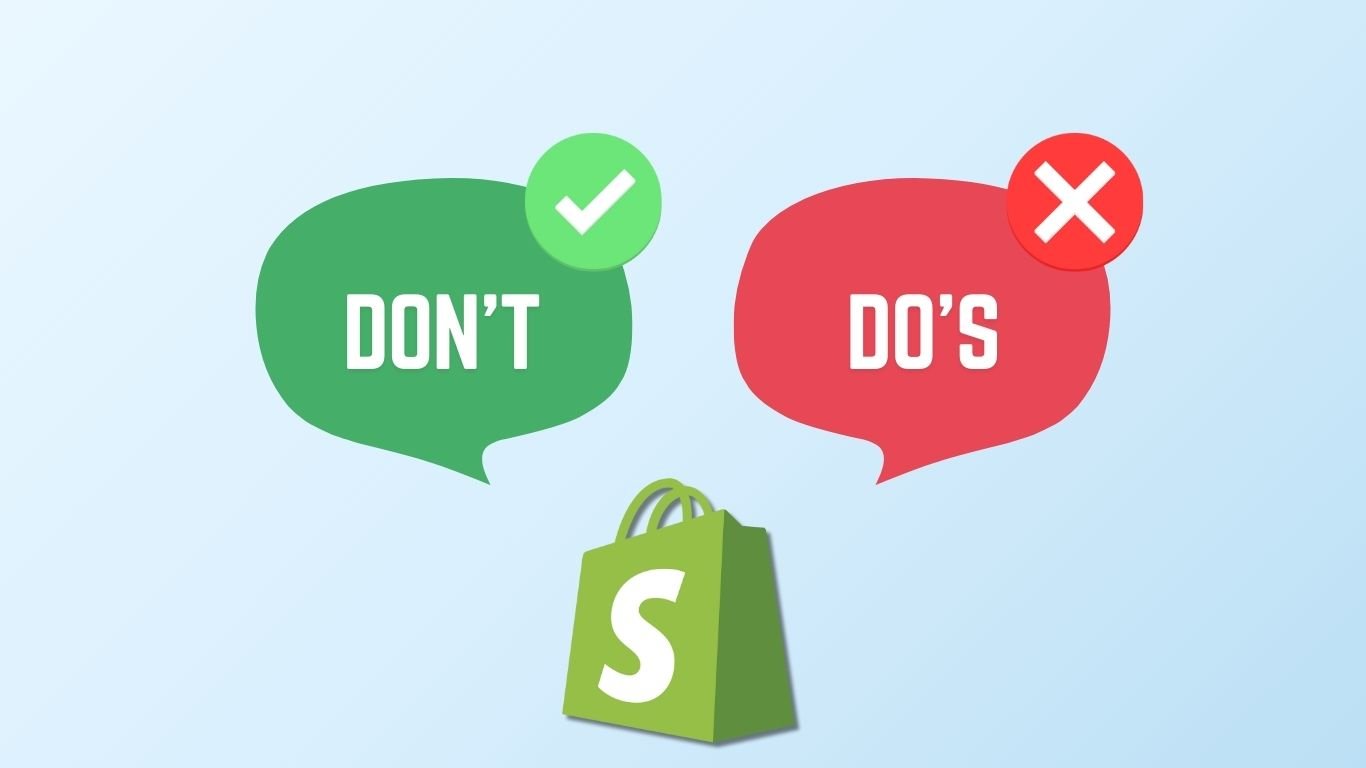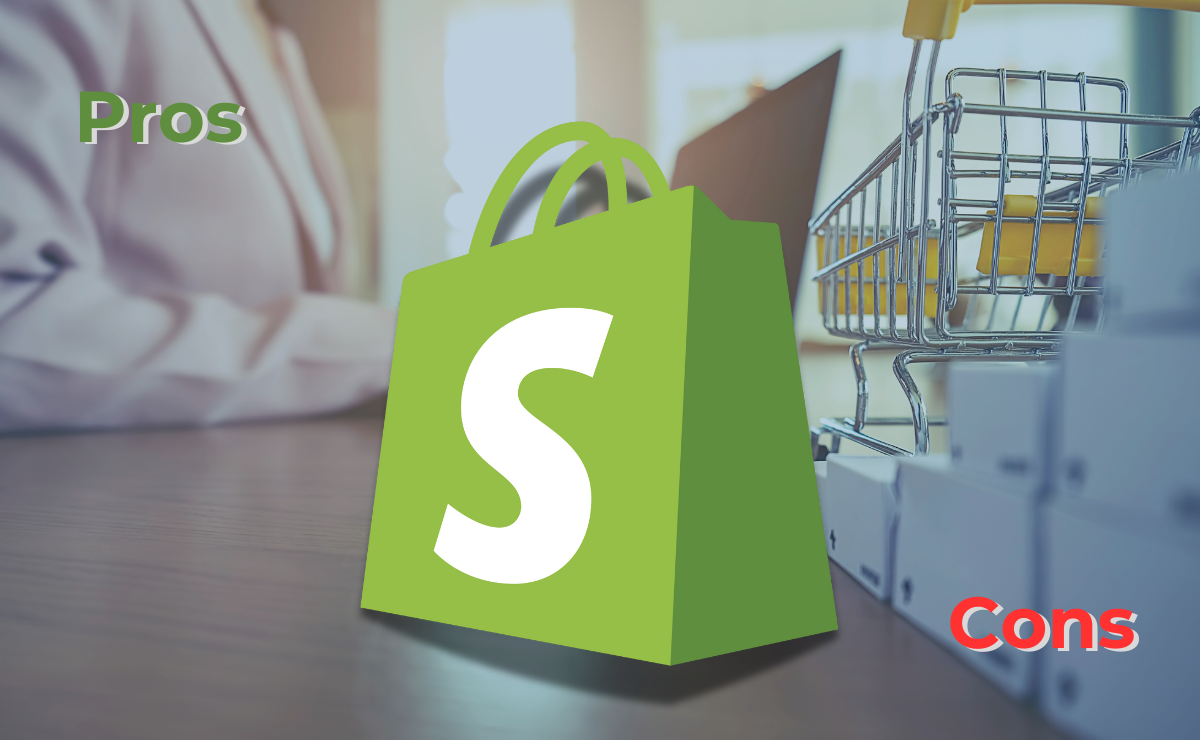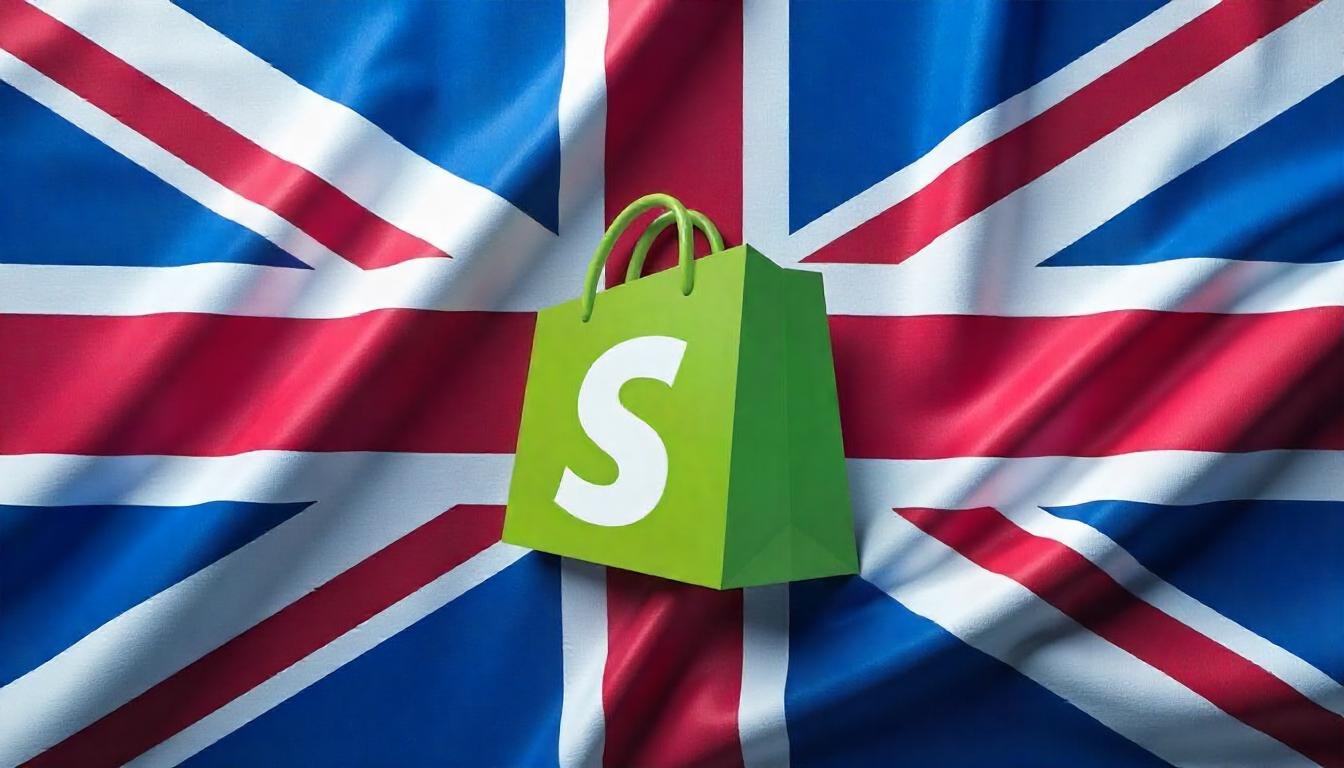
Shopify eCommerce in the UK: The Complete Guide for Beginners
- 2025-05-13
-
0

If you’ve been considering starting an online business in the UK, you’re not alone. Ecommerce models with low startup costs and minimal inventory needs are becoming increasingly popular. Pair this with Shopify’s user-friendly interface and robust app ecosystem, and you’ve got a recipe for success!
This guide will walk you through everything you need to know about Shopify Ecommerce in the UK—from setting up your store to finding the best apps and suppliers, and even tips for scaling your business.
Get ready to build a business that scales without the headache of managing stock or expensive overheads.
What Is Shopify Ecommerce?
Shopify ecommerce is a business model where you sell products online without keeping inventory. When a customer places an order on your store, it’s forwarded directly to a supplier who ships the product straight to them. Your role is to manage the storefront, market the products, and deliver a great customer experience.
Why Is Shopify Ecommerce Popular in the UK?
There are several reasons why aspiring entrepreneurs in the UK are choosing Shopify for ecommerce:
-
Low barrier to entry: You don’t need a warehouse or an upfront stock investment.
-
User-friendly platform: Shopify’s intuitive interface makes it easy to create a professional-looking store.
-
Global reach: With Shopify’s tools, you can cater to UK customers or expand to international markets.
-
Wide app ecosystem: Shopify offers a variety of apps specifically for UK ecommerce to streamline processes.
Benefits of Shopify Ecommerce in the UK
Before jumping in, it’s important to understand what makes this model so attractive for UK entrepreneurs.
Minimal Upfront Investment
One of the biggest benefits of ecommerce is that you don’t need to purchase inventory upfront. Your supplier only charges you when you’ve made a sale, making this a low-risk business model ideal for beginners.
Flexibility and Scalability
With Shopify, your UK ecommerce business is completely online. This means you can work from anywhere, scale your operations effortlessly, and add new products to your catalogue without breaking the bank.
Broad Product Options
Whether you want to sell fashion, beauty, electronics, or eco-friendly products, Shopify’s ecommerce apps can connect you with UK-based suppliers who offer a range of products and allow for fast shipping times within the country.
No Need for Warehousing
Say goodbye to the headaches of managing physical stock or logistics. Your suppliers handle all inventory and fulfilment, so you can focus on growing your customer base.
Cons of Shopify Ecommerce in the UK
While Shopify ecommerce offers plenty of exciting benefits, it’s important to be aware of the potential drawbacks as well.
Lower Profit Margins
One of the key challenges of ecommerce is managing profit margins. Since you are sourcing products from suppliers and not buying in bulk, the costs per item can be higher, leaving you with slimmer margins. This means you’ll need to sell higher volumes or price strategically to maximize profits.
Competitive Market
The popularity of ecommerce has created a crowded marketplace. With many businesses sourcing from the same suppliers, it can be difficult to differentiate your store and stand out from the competition, especially in a niche market.
Limited Control Over Customer Experience
Since your suppliers handle inventory and shipping, you have minimal control over aspects like packaging, delivery times, and product quality. This can impact customer satisfaction and your ability to build a brand image if issues arise that are out of your control.
Reliance on Suppliers
Running an online store without holding inventory means putting full trust in your suppliers to deliver orders promptly and accurately. Any delays, stock shortages, or mistakes on their end can reflect poorly on your business, even though they’re outside of your direct control.
Understanding these cons can help you weigh the pros and cons of Shopify ecommerce to decide if it’s the right model for your UK-based business.
Is Shopify Ecommerce Profitable in the UK?
The profitability of Shopify ecommerce in the UK depends on several key factors, but with the right approach, the potential to build a lucrative business is absolutely there. Running an inventory-free ecommerce store eliminates the need to handle inventory, making it an appealing model for entrepreneurs who want to minimize upfront costs and logistical challenges. For example, a UK-based entrepreneur could start by selling phone accessories like cases and screen protectors, or trending fitness equipment like resistance bands, both of which have proven demand in the e-commerce market. With a well-chosen niche and an effective marketing strategy, you can tap into the UK’s thriving e-commerce market and carve out a profitable space for your business.
The key to success lies in targeting the right audience and offering products that resonate with their needs or interests. For instance, targeting eco-conscious shoppers with reusable water bottles or bamboo cutlery could be a profitable niche in today’s environmentally aware market. By researching trending products and selecting a niche that appeals to a well-defined target audience, you can increase your chances of success. Effective marketing is also critical—tools like Facebook Ads, Google Ads, or TikTok Ads enable you to reach ready-to-buy customers with precision targeting. For example, a viral TikTok ad could showcase a unique product like a foldable travel mug, instantly driving traffic to your Shopify store. Email marketing and influencer partnerships, such as collaborating with micro-influencers in your niche, can further amplify your brand visibility.
Another advantage of Shopify is its user-friendly platform, which allows you to launch and manage a store with minimal technical expertise. Shopify provides a suite of tools to help you create a professional-looking store, track analytics, and integrate with third-party apps for added functionality. For example, you can use Oberlo to source trending fashion items like summer dresses or Spocket to sell products from UK-based suppliers, reducing shipping times and costs. AliExpress is another popular option for sourcing products like home decor items or pet accessories, streamlining the process of fulfilling orders.
The UK offers a strong consumer base with a growing appetite for online shopping. For instance, categories like health and wellness, pet supplies, and home improvement products have seen significant growth in recent years. By managing operational costs efficiently, setting competitive prices, and fostering strong relationships with reliable suppliers, you can secure impressive profit margins. Additionally, offering exceptional customer service—such as providing live chat support, hassle-free returns, and fast shipping options—can help you stand out in the competitive ecommerce space.
However, it’s important to note that profitability isn’t guaranteed. Running an inventory-free ecommerce business requires diligence, continuous optimization, and the ability to adapt to changing market trends. For example, you may need to pivot from selling seasonal products like winter gloves to evergreen items such as phone chargers to maintain year-round sales. Regularly analyzing your store’s performance, fine-tuning your product offerings, and staying on top of customer feedback are essential to maintaining profitability. You also need to be prepared to deal with challenges like fluctuations in supplier reliability, shipping delays, and rising ad costs.
When done right, Shopify ecommerce can be a highly profitable venture in the UK. It offers entrepreneurs the freedom and scalability to grow their businesses without the burden of managing physical inventory. While success requires effort and persistence, the rewards of creating a thriving online store can be significant, providing financial independence and the flexibility to run your business from anywhere. For example, many successful UK online entrepreneurs have turned niches like sustainable beauty products or unique tech gadgets into thriving six-figure businesses, proving the potential of this model when executed effectively.
The 6 Steps to Start Shopify Ecommerce in the UK
1. Choose Your Niche
Start by identifying a niche that excites you and aligns with your target audience. Whether it’s sustainable beauty products or tech gadgets, choosing a focused niche will help you stand out against competitors.
A good niche should meet these criteria:
-
High demand
-
Unique or hard-to-find products
-
Reasonable profit margins (aim for at least 40%)
-
Passionate customer base
2. Set Up Your Shopify Store
Shopify makes it simple to get started. Here’s how to set up your UK online store step by step:
-
Create a Shopify account and purchase your domain name: Start by signing up for a Shopify account. You can choose a free trial to explore the platform before committing. Once your account is set up, purchase a domain name that reflects your brand and is easy for customers to remember.
-
Choose a template from Shopify’s wide selection of free and paid themes: Shopify offers a variety of professionally designed themes to suit different industries and styles. Browse through the options and select a theme that prioritises usability, is mobile-friendly, and complements the look and feel of your brand.
-
Customise your store by adding images, logos, and your unique branding: Personalisation is key to standing out. Add high-quality product images, your logo, and customize the colours and fonts to align with your brand identity. Don’t forget to write a compelling "About Us" page and set up a navigation menu for an easy shopping experience.
With these steps, your online store will be ready for business in no time!
3. Find the Right Shopify Apps for UK Sellers
Shopify offers a wide variety of apps designed to make ecommerce simpler and more efficient for UK sellers. These apps help streamline your workflow by making it easy to source reliable products, automate order fulfilment, and manage daily business operations. Choosing the right apps can save you time, reduce errors, and provide a much better experience for your customers. Some of the top options to consider include:
-
Oberlo: Perfect for importing products directly into your Shopify store. Oberlo allows you to browse and select products from AliExpress and add them to your store in just a few clicks.
-
Spocket: A great choice for finding UK and EU suppliers that offer fast shipping. Spocket helps ensure quicker delivery times for your customers by working with local and regional suppliers.
-
Zendrop: Ideal for automating supplier communication and offering custom branding options. Zendrop also provides tools for tracking shipments and managing inventory seamlessly.
-
DSers: Specialises in bulk order fulfilment and is particularly effective for those who rely on AliExpress. DSers simplifies product imports and order processing for high-volume sellers.
-
TS Scout: A powerful tool for analysing product trends and profitability. It helps you identify which items are likely to sell well so you can make smarter inventory decisions.
These apps are specifically tailored for ecommerce in the UK, connecting you to reliable suppliers and providing smoother fulfilment processes. By using these tools, you can ensure faster delivery times and a better overall experience for your customers while focusing on growing your business.
4. Identify Reliable UK Suppliers
Not all suppliers are created equal, and choosing the right one can make or break your online business. To ensure a seamless customer experience, it’s crucial to work with UK-based suppliers or those who can fulfil orders within the country quickly and efficiently. Long shipping times or poor-quality products can lead to dissatisfied customers and higher return rates, which might hurt your reputation.
TS Scout simplifies this process by helping online sellers find trustworthy suppliers on platforms like AliExpress, ensuring fast shipping, quality products, and dependable service. Partnering with the right supplier allows you to focus on growing your business instead of worrying about logistics.
Here’s what to look for in a supplier:
-
Fast shipping times: Customers expect quick delivery, so prioritize suppliers who offer efficient shipping options.
-
High-quality products: The durability and quality of the products you sell impact customer satisfaction and repeat business.
-
A reliable inventory system: Work with suppliers who can ensure stock availability to avoid unnecessary delays or cancellations.
-
Positive reviews and testimonials: Check ratings and feedback from previous buyers to gauge the supplier’s reliability and credibility.
Investing time in finding dependable suppliers will set the foundation for long-term success and keep your customers coming back for more.
5. Optimize for SEO and Drive Traffic
To ensure your Shopify store thrives, driving traffic is essential. Below are detailed strategies to attract potential customers and boost visibility:
-
Optimize Product Listings with Targeted Keywords
Start by conducting keyword research to identify what your target audience is searching for. Use specific, high-traffic keywords in your product titles, descriptions, and meta tags. Ensure your content is clear, engaging, and relevant to improve search rankings.
-
Leverage Social Media Advertising
Platforms like Facebook, Instagram, and TikTok offer powerful advertising tools to help you reach a highly targeted audience. Create visually appealing ads that highlight your products, and use features like audience segmentation to tailor campaigns based on demographics, interests, and behaviors.
-
Invest in Email Marketing
Build an email list by offering incentives such as discounts or free guides. Use email campaigns to nurture leads, announce new products, share promotions, and send personalized recommendations. A well-crafted email strategy can turn casual visitors into loyal customers.
-
Collaborate with Influencers
Partner with influencers who align with your niche and target audience. These collaborations can include product reviews, unboxings, or sponsored posts. Influencers can help create trust and introduce your products to a broader audience.
-
Focus on Content Marketing
Create valuable content like blogs, how-to guides, and videos related to your products or niche. For example, if you run an ecommerce store, you could write about topics such as “5 Proven Ways to Boost Your Online Sales,” “Beginner’s Guide to Choosing the Right Products,” or “How to Market Your Store on TikTok and Instagram.” High-quality content not only improves your SEO but also positions your store as a trusted authority in your industry.
-
Utilize Analytics to Refine Your Strategy
Regularly monitor tools like Google Analytics and Shopify reports to track traffic sources, conversion rates, and customer behavior. Use this data to identify what’s working and make adjustments to your strategy.
-
Engage in Community Marketing
Participate in forums, Facebook groups, or Reddit communities relevant to your niche. Share advice, answer questions, and subtly promote your store without being overly salesy. Building a presence in online communities can drive organic traffic.
By combining these strategies, you'll not only drive more traffic to your Shopify store but also create a sustainable growth model that fosters long-term success.
6. Provide Excellent Customer Support
Outstanding customer service can be your secret weapon in building trust and loyalty with your customers. When customers feel heard and supported, they are more likely to return and recommend your business to others. Use tools like Zendesk or Shopify’s built-in customer service features to handle inquiries quickly and effectively, ensuring no question or concern goes unanswered. Offering multiple communication channels, such as live chat, email support, or even phone support, can make all the difference in customer satisfaction. Additionally, consider implementing a comprehensive FAQ section to address common questions and streamline the support process. Remember, exceptional support isn't just about solving problems—it's about creating positive experiences that keep customers coming back.
Scaling Your Shopify UK Online Store
Once you’ve ironed out the basics and made consistent sales, you can focus on scaling your operations. Growing your store requires a strategic approach to reach new customers, increase your revenue, and optimize the shopping experience. Here are some effective strategies to consider:
-
Expanding your product catalogue. Use insights from your Shopify analytics to identify trending products and customer preferences. Focus on sourcing high-quality products with strong demand and consider adding complementary products that align with your niche. Regularly refresh your catalogue to keep it engaging and updated.
-
Offering discounts, loyalty programs, or bundles. Create special promotions, such as limited-time discounts or buy-one-get-one offers, to attract new customers and boost sales. Implement a loyalty program to reward repeat customers with points they can redeem for future purchases. Bundling related products together at a discounted rate can also encourage customers to spend more per order.
-
Running retargeting campaigns. Retarget site visitors who didn’t convert on their first visit through ads on social media, Google, or other platforms. Use personalized messages or promotions to re-engage them and entice them to complete their purchase. Consider email marketing as well to follow up with abandoned cart reminders or exclusive offers tailored to their browsing history.
By focusing on these strategies, you can steadily grow your Shopify online store and build a loyal customer base while increasing your revenue.
Is Shopify Ecommerce Right for You?
Launching an online store with Shopify in the UK offers an incredible opportunity for aspiring entrepreneurs to launch their eCommerce businesses with minimal upfront investment and reduced risk. This model allows you to sell products without holding inventory, as orders are fulfilled directly by suppliers. By leveraging Shopify's UK-targeted apps and tools, like Oberlo or Spocket, you can efficiently manage your store, find trending products, and streamline the order fulfillment process.
With Shopify, you also benefit from a range of features like professional website templates, integrated payment options, and marketing tools to help you grow and scale your business. Whether you’re targeting a UK audience or looking to expand globally, Shopify provides the flexibility to adapt to your goals.
If you’re ready to take the next step, start by setting up your Shopify store. Explore the wide range of ecommerce apps available to find suppliers and products that align with your niche. Pair this with a strong focus on providing an excellent shopping experience through clear product descriptions, fast shipping, and responsive customer service. With Shopify’s host of solutions and your dedication, success in the world of ecommerce is absolutely within reach.
FAQ About Ecommerce on Shopify UK
1. What is the no-inventory business model, and how does it work on Shopify?
This is a retail model where you sell products directly to customers without stocking inventory yourself. On Shopify, you can set up an online store, integrate with ecommerce apps such as Spocket, and start selling products that are fulfilled directly by suppliers.
2. Do I need a business license to run an inventory-free store in the UK?
While Shopify doesn’t require you to have a business license to start, many areas in the UK may require one depending on the scale and nature of your business. It's advisable to consult local regulations.
3. How do I find reliable suppliers in the UK?
Shopify offers a range of ecommerce apps like Spocket and UK-specific suppliers, which allow you to source high-quality products with fast shipping times. Research reviews and build strong communication with suppliers to ensure reliability.
4. Can I offer fast shipping to UK customers with an inventory-free business model?
Yes! By choosing suppliers based in the UK or near your target market, you can provide quicker delivery times. This is crucial for creating a positive customer experience.
5. How can I handle returns and refunds?
Returns and refunds policies depend on your supplier's agreements. You should clearly outline these policies in your store and work closely with suppliers to streamline this process for customers.
6. How do I market my Shopify online store in the UK?
Leverage digital marketing strategies such as social media advertising, email marketing, and search engine optimization (SEO). Running targeted ads for UK audiences on platforms like Facebook or Instagram can help generate traffic and sales.
7. What are the costs of starting a Shopify inventory-free business in the UK?
The costs typically include Shopify's subscription fee, any premium product sourcing or fulfillment app fees, marketing expenses, and domain registration. Once operational, the margin you earn comes from the difference between the product cost from suppliers and the price customers pay.
8. How do I ensure my store stands out in the UK market?
To stand out, focus on a specific niche, build a visually appealing store, provide exceptional customer service, and ensure mobile-friendly site design. Highlight unique selling points like fast UK shipping or exclusive products to engage your audience.
like?









